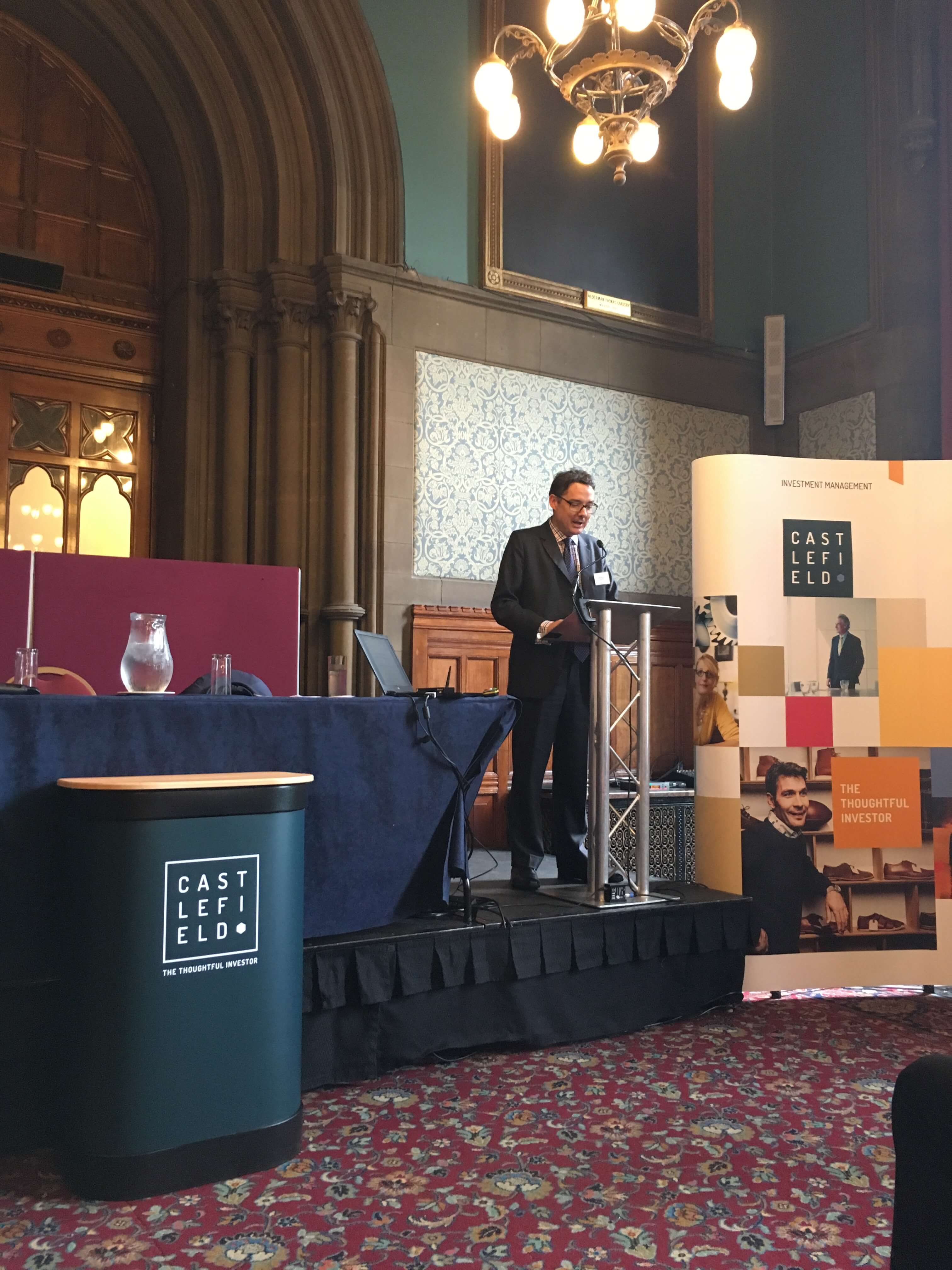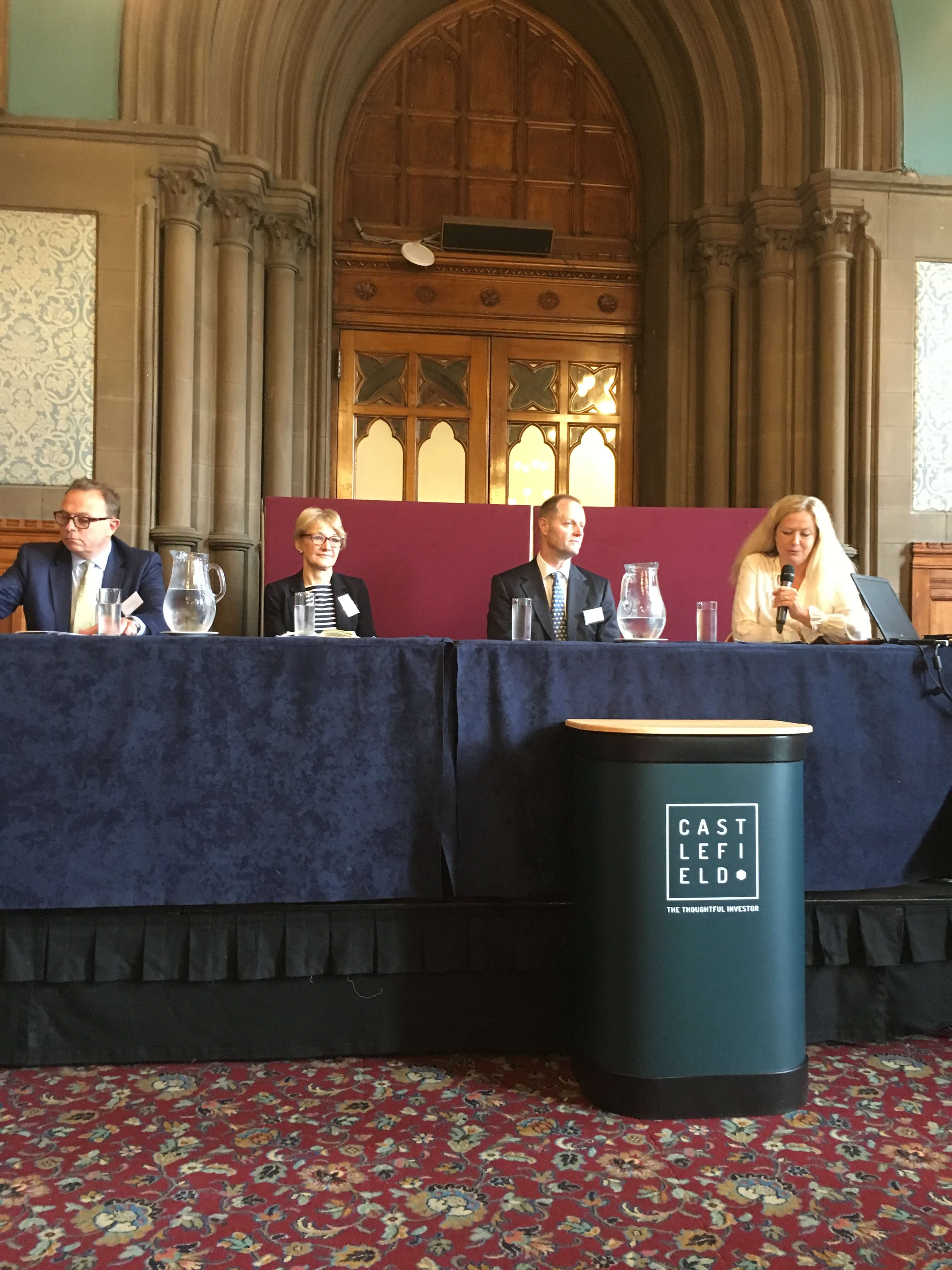Castlefield Manchester Investor Day
On the 27th of June in the Victorian grandeur of Manchester Town Hall, Castlefield hosted our inaugural “Investor Day”. The first half of the day centred around the question of corporate social responsibility (CSR) and whether there needs to be a re-think of the current approach businesses take. Castlefield Managing Partner, John Eckersley, started by sharing the thought behind the event and introducing our key note speaker, Mark Campanale.

Manchester Town Hall Bee Mosaic

John Eckersley speaks at the Investor Day
Mark has been a member of the investment profession for 25 years and founded responsible funds at the likes of Jupiter, NPI and Henderson Global Investor. He has moved away from investment management in recent years to focus on his not-for-profit organisation, the Carbon Tracker Initiative. Carbon Tracker is a financial think tank aimed at enabling a climate secure global energy market by aligning capital market actions with climate reality. Mark touched on his motivation behind starting a career in financial services and what keeps him motivated today. He reminisced about protesting outside Kingston town hall as a young man to prevent public money going to companies supporting the apartheid government in South Africa. He realised the importance of responsible investment and the power for good that it can be. That spirit of activism lives in his work today. He talked about how the globally acclaimed research produced by the Carbon Tracker Initiative has helped to shape the discussion surrounding investment in fossil fuels and even changed the language we use. The reports produced by carbon tracker coined the phrases “carbon bubble” and “stranded assets” which are now widely used to describe the problems of investing in businesses that rely on finite and polluting resources. The compelling research and analysis produced by the think-tank has helped to ensure society sits up and takes note of the issues surrounding carbon investment. Mark’s talk highlighted the good that responsible allocation of capital can do and the positive power of the markets, as well as cautioning that the current way in which we value oil companies is not compatible with achieving the Paris Climate accord.
Following a traditional Mancunian refreshment break of Eccles cakes and tea, the second session started. It was led by Castlefield’s own Olivia Bowen and brought together professionals from different areas of responsible business to discuss their experience and different approaches. Richard Cook from the Social Stock Exchange, Katie Hill from B Lab and Peter Matthews from Capital for Colleagues formed the panel and were quizzed on their organisation’s attitude to responsibility and what it meant to them.

Panel Discussion
Richard told attendees of the work that the Social Stock Exchange do as the world’s only exchange that allows members to trade and connect to those in the impact investment community made up of like-minded companies and investors.
Katie shared how the non-profit B Lab organisation supports the building of a global community of Certified B Corporations (B-Corps). B-Corps are businesses that meet the standards of social and environmental performance, public transparency, and legal accountability. If these standards are achieved, then these companies are awarded the B-Corp certification. Katie spoke about how this growing movement means that businesses can ensure that society will enjoy more shared prosperity.
Peter spoke about the positive impact of employee ownership and how a greater level of understanding about the benefits of businesses sharing their success with the employees they rely on can help to achieve positive impacts -and of course we at Castlefield, as an employee-owned business, can vouch for this. Capital for Colleagues advises, invests in and supports the growth of businesses which are or want to become employee owned.
All members of the panel gave examples of companies they're involved with as case studies, it was interesting to hear real world stories of impact in action.
The event was truly made by the engaged and well informed audience that grasped the opportunity to ask questions and steer the conversation with the speakers. The ideas discussed with both Mark and the panellists gave a greater insight into the issues that attendees were concerned about or interested in, and provided the opportunity for all involved to expand on ideas touched on in the structured portion of the sessions.
Following the afternoon symposium, we made our way over to Home cinema for the evening’s festivities. The stylish new building stands opposite the famous former Hacienda nightclub meaning guests who had been to both the afternoon and evening sessions were treated to a full range of beautiful Manchester architecture, from the neo-gothic town hall to the modern development at Tony Wilson Place.
The second part of our investor day consisted of the Northern premiere of E-LIFE, an environmental documentary directed by Ed Scott-Clarke and co-produced by Castlefield. We were proud to have provided the seed grant for this project and thought our inaugural Investor Day would be the perfect opportunity to showcase this powerful documentary. We were not disappointed. Ed’s film uncovers the growing global problem of electronic waste and delves into the muddled and poorly regulated industry of E-waste exportation. The film uncovers the shocking phenomenon of the shipment of hazardous waste from Europe and the US to developing countries. The crew visited the Agbogbloshie scrapyard in Ghana and captured how the local people are often unprepared yet left to deal with tonnes of hazardous waste, risking fatal illnesses and shocking levels of soil contamination.
The film asks the audience to think about how the newest technology is designed for style but not sustainability. The many component metals are not easily separated and therefore cannot be recycled in a straightforward way. Ed meets the manufacturers of new products on the market (for example Fair Phone – available from The Phone Co-op) that can be fixed and recycled at the end of their useful life rather than accumulating in dumps around the world. Producing gadgets without the circular economy in mind leads to disastrous human and environmental consequences. E-LIFE encourages us to be more thoughtful about our choices and consider the circular economy rather than the traditional "take, make, dispose" economic model.
Castlefield’s first investor day was a brilliant success. Informative and thought provoking, all those that attended took away important information on the positive change we can have if we are thoughtful about our impact, be it through recycling our electronic products or making financial decisions that reflect our values.
by Kate Hewitt